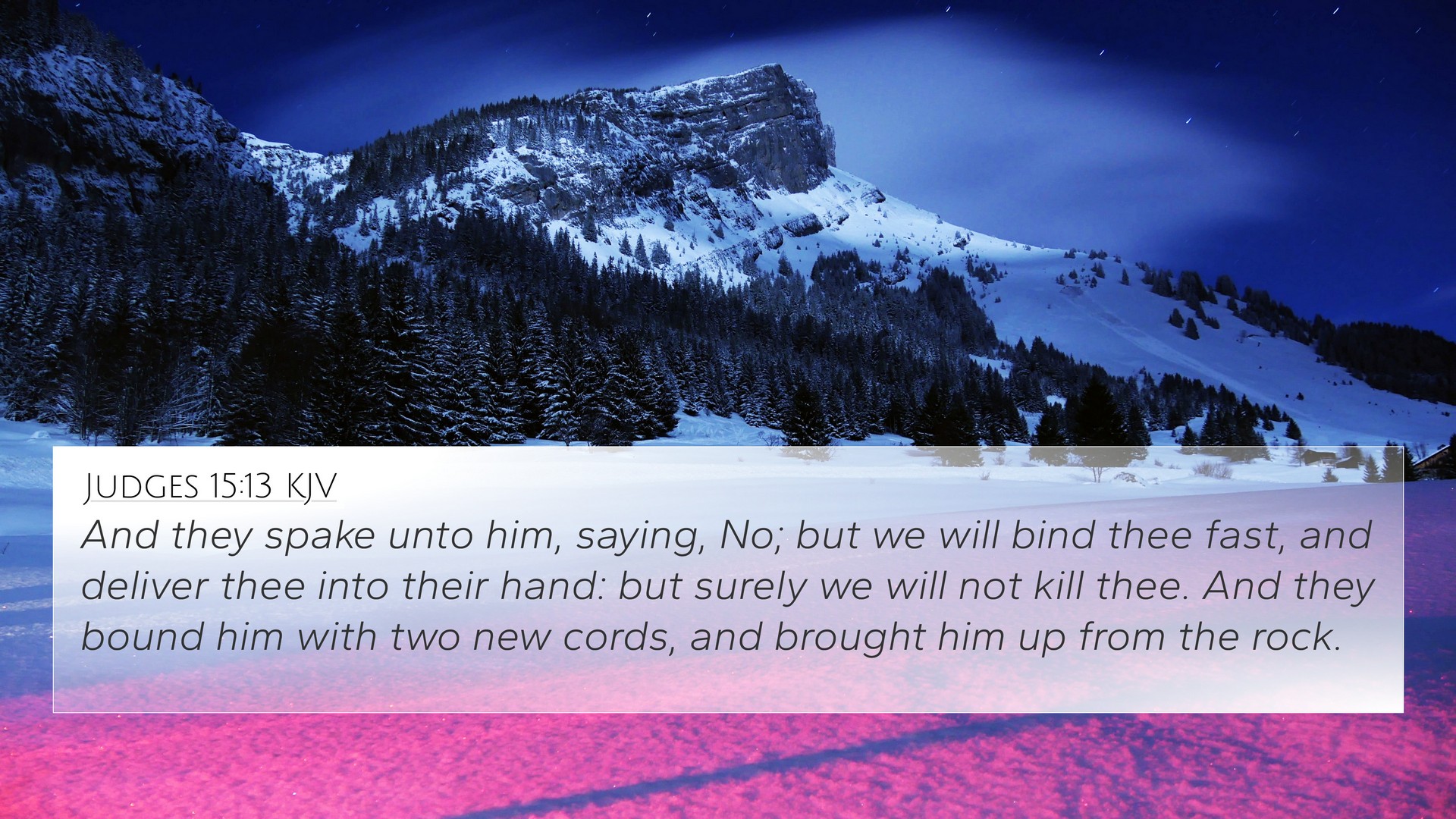Old Testament
Genesis Exodus Leviticus Numbers Deuteronomy Joshua Judges Ruth 1 Samuel 2 Samuel 1 Kings 2 Kings 1 Chronicles 2 Chronicles Ezra Nehemiah Esther Job Psalms Proverbs Ecclesiastes Song of Solomon Isaiah Jeremiah Lamentations Ezekiel Daniel Hosea Joel Amos Obadiah Jonah Micah Nahum Habakkuk Zephaniah Haggai Zechariah MalachiJudges 15:13 Similar Verses
Judges 15:13 Cross References
And they spake unto him, saying, No; but we will bind thee fast, and deliver thee into their hand: but surely we will not kill thee. And they bound him with two new cords, and brought him up from the rock.
Uncover the Rich Themes and Topics of This Bible Verse
Listed below are the Bible themes associated with Judges 15:13. We invite you to explore each theme to gain deeper insights into the Scriptures.
Judges 15:13 Cross Reference Verses
No cross reference images were found in our system for this Bible passage.
Judges 15:13 Verse Analysis and Similar Verses
Understanding Judges 15:13
The verse from Judges 15:13 is pivotal in the narrative of Samson, offering significant insights into themes of conflict, deliverance, and divine providence. Drawing from respected public domain commentaries by Matthew Henry, Albert Barnes, and Adam Clarke, we can explore the depth of meaning found within this scripture.
Text of Judges 15:13
"But they said to him, 'No, we will bind you fast and deliver you into their hand: but surely we will not kill you.' And they bound him with two new cords, and brought him up from the rock."
Summary of Meaning
This verse depicts a moment where Samson is captured by the men of Judah, who, fearing the Philistines, chose to bind Samson under the pretense of delivering him to the enemy rather than risking conflict themselves. This highlights a critical point of introspection regarding loyalty, fear, and the complexities of divine choices displayed through human actions.
Insights from Commentaries
- Matthew Henry: Henry emphasizes the irony of Judah’s actions, praising Samson for his strength yet illustrating their lack of faith in divine deliverance. He notes how fear can lead to betrayal among allies.
- Albert Barnes: Barnes remarks on the necessity of binding Samson with new cords, symbolizing a fresh beginning for a precarious moment in Israel's history. He explains how this act symbolizes both trust and submission under duress.
- Adam Clarke: Clarke identifies the historical context of the Philistine oppression and Judah’s predicament, highlighting that the Israelites preferred subjugation over facing their oppressors, which underscores the need for spiritual awakening and trust in the Lord.
Thematic Connections
Judges 15:13 opens the door to various interconnected themes within scripture:
- Faith vs. Fear: The choice between trusting God and relying on human wisdom permeates throughout scripture.
- Deliverance: The motif of being bound or captive only to experience divine rescue parallels the experiences of many biblical heroes.
- Divine Sovereignty: The tension between human decisions and God’s overarching plan is evident here and in other parts of the Bible.
Cross-References for Judges 15:13
Several Bible verses resonate with the themes and situations presented in Judges 15:13:
- Hebrews 11:32-34: This passage highlights the feats of faith that Samson exemplified, encouraging believers in times of fear.
- 1 Samuel 10:8: Reference to gathering the people to the Lord, highlighting themes of binding and release.
- Psalm 105:17-21: God sending Joseph ahead as a means of deliverance connects to the motif of divine intervention.
- Romans 8:31-32: “If God be for us, who can be against us?,” emphasizing divine support amidst human trials.
- Acts 5:29: The exhortation to obey God rather than men parallels the choices faced by Samson and Judah.
- Matthew 26:56: Disciples abandoning Jesus reflects similar themes of fear and betrayal evident in Judges.
- Galatians 5:1: The call for freedom resonates deeply with the concept of being bound.
- 2 Timothy 1:7: “For God hath not given us the spirit of fear;” a direct reflection on the foundational conflict in this passage.
- James 1:12: Testing of faith leading to patience is reflective of experiencing trials, much like what Samson faced.
- Philippians 4:13: “I can do all things through Christ which strengtheneth me,” echoes the strength that comes from divine assistance.
Applications and Reflections
The narrative within Judges 15:13 serves as a poignant reminder for contemporary believers. It encourages reflections on the nature of our commitments to God versus the pressures of societal expectations. It invites us to evaluate our faith when faced with adversities, drawing strength from the Lord, much like Samson was called to do.
Tools for Biblical Cross-Referencing
When studying passages such as Judges 15:13, utilizing tools for cross-referencing can deepen understanding. Resources such as a Bible concordance or a Bible cross-reference guide provide invaluable insights into connecting scriptures, enhancing both personal devotion and scholarly study.
Conclusion
Judges 15:13, when considered within the broader context of the biblical narrative, reveals the complexities of human nature in the face of divine purpose. Understanding this verse through cross-referencing and thematic connections enriches our spiritual journey and fuels our faith in God’s plans, reminding us that even in times of betrayal and fear, God is working towards our deliverance.


